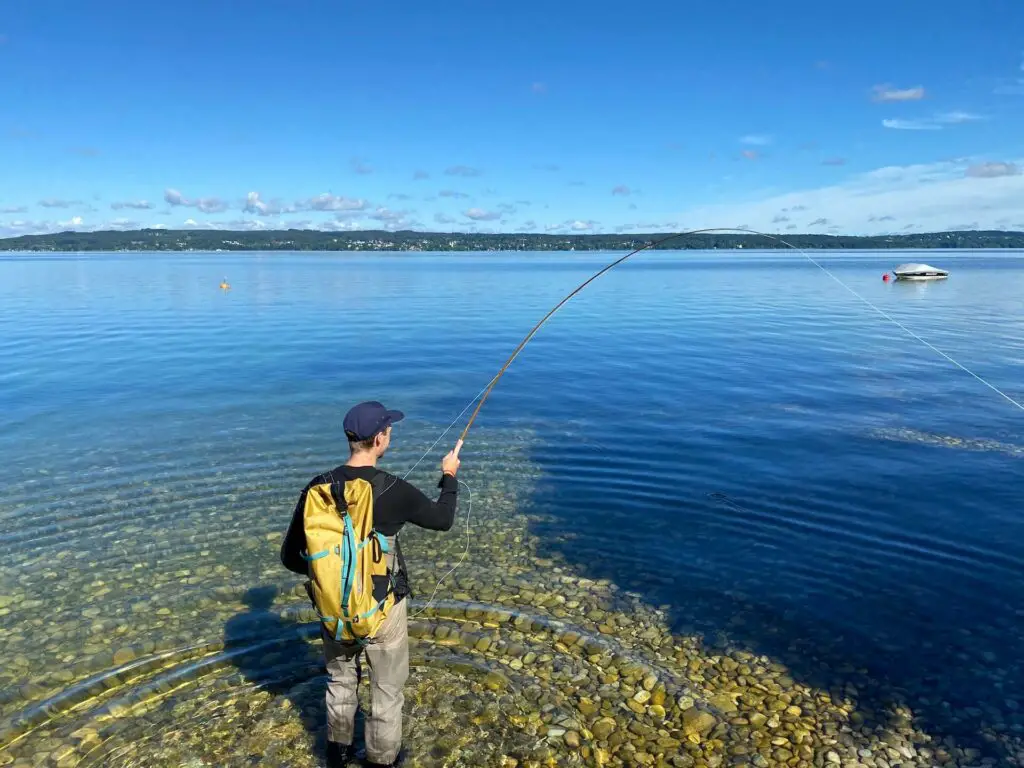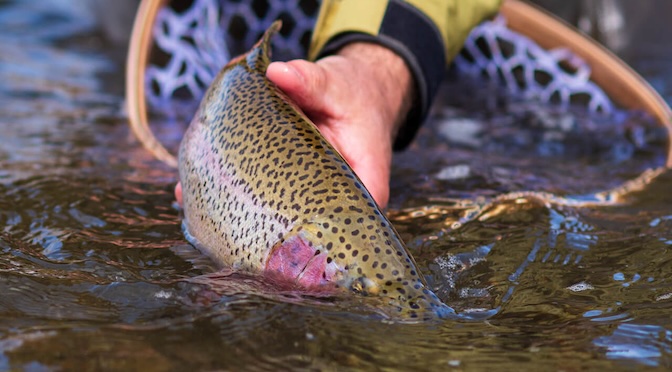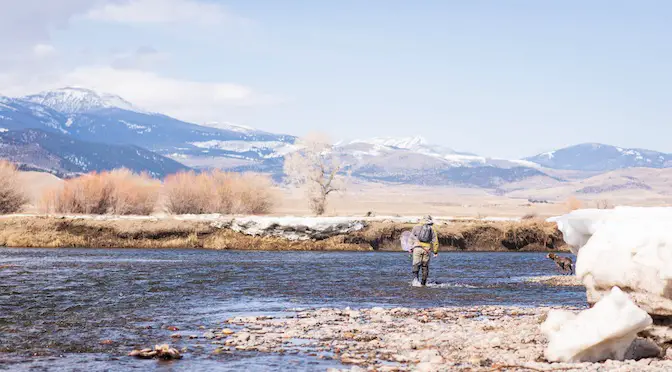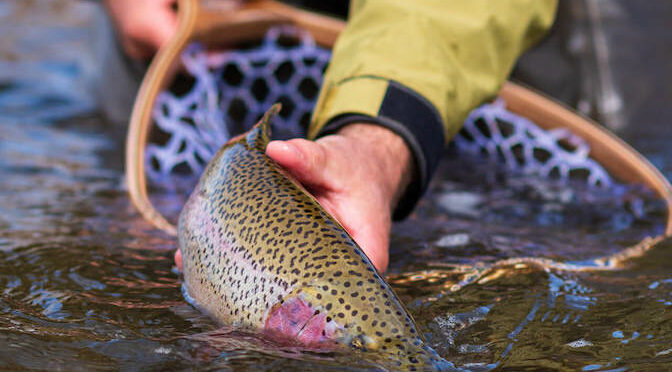Last updated on December 7th, 2023.
- Wading Wisdom #13 – Simon Gawesworth - July 7, 2025
- On the Water with the Korkers Bantam Lite - June 26, 2025
- How to Find Trout in Rivers & Streams Anywhere - June 13, 2025
Selecting the right backpack is crucial, especially if you’re navigating through unpredictable weather.
Two primary contenders in the market are waterproof and water-resistant backpacks, each offering unique features to cater to different needs. In this guide, we’ll delve into the distinctions between the two, exploring waterproof backpacks with cutting-edge features like fully waterproof zippers and water-resistant backpacks designed to repel the elements.
In fly fishing waterproof backpacks play a crucial role when you’re out in the backcountry and need to make absolutely sure your gear stays dry no matter the conditions. The same goes for hiking where you can often be surprised by a heavy shower since the weather can change quickly and unexpectedly in the mountains.
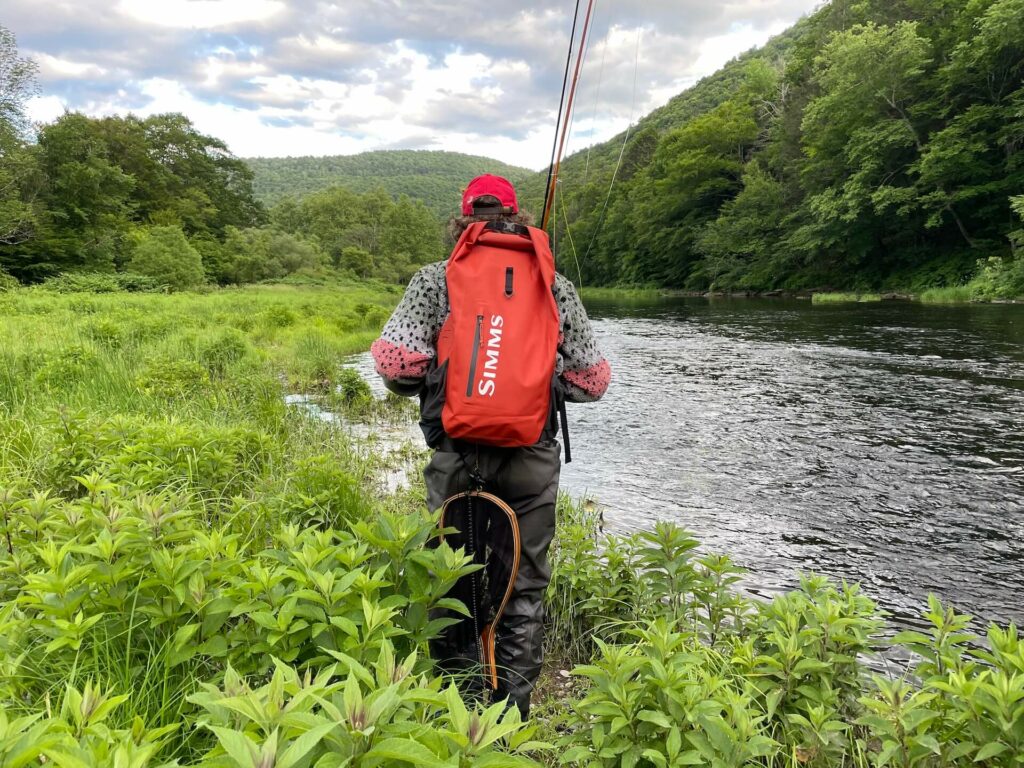
Waterproof Backpacks: Beyond the Basics
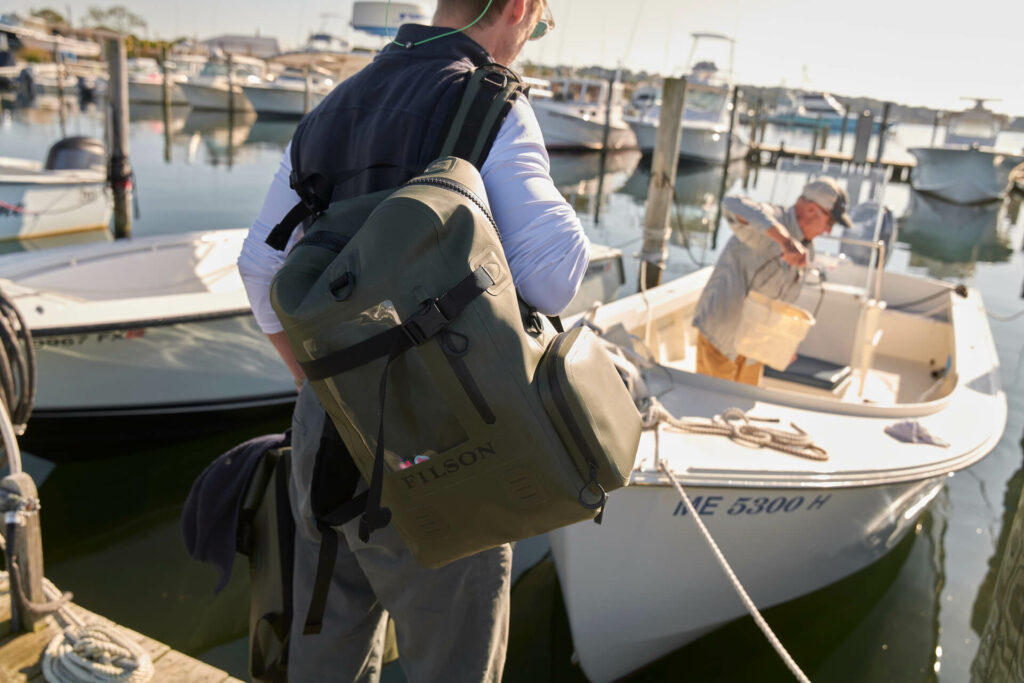
Fully Submersible Backpacks
For those who brave the elements with a sense of adventure, fully submersible backpacks are the ultimate choice. Crafted from high-tech materials, these backpacks go beyond mere water resistance – they are designed to be fully submersible. Whether you’re kayaking through rivers, facing torrential downpours, or crossing streams, these backpacks ensure your gear remains bone dry. Look for renowned brands that utilize advanced sealing techniques and materials, providing a true watertight seal against the elements.
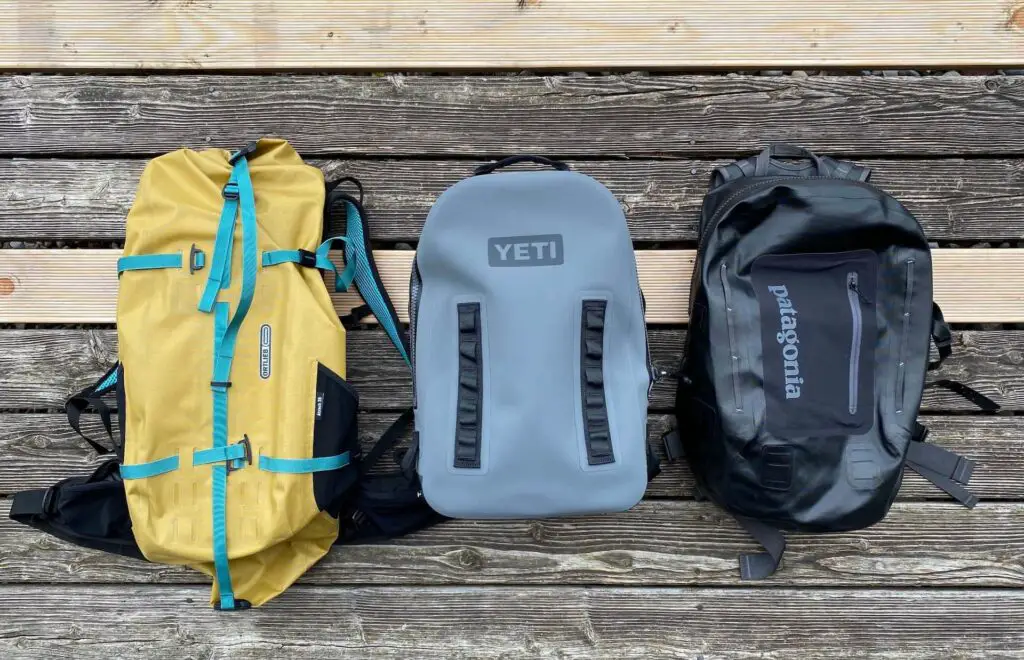
Waterproof Zippers: The Seal of Protection
Waterproof zippers are the unsung heroes of keeping your belongings safe in wet conditions. Unlike traditional zippers, these are designed with tight seals to prevent water from seeping through the zipper teeth. They offer an added layer of protection, especially in areas prone to heavy rain or when your backpack is exposed to splashes. When shopping for a waterproof backpack, pay attention to the type of zippers used – opt for those labeled as waterproof for maximum peace of mind.
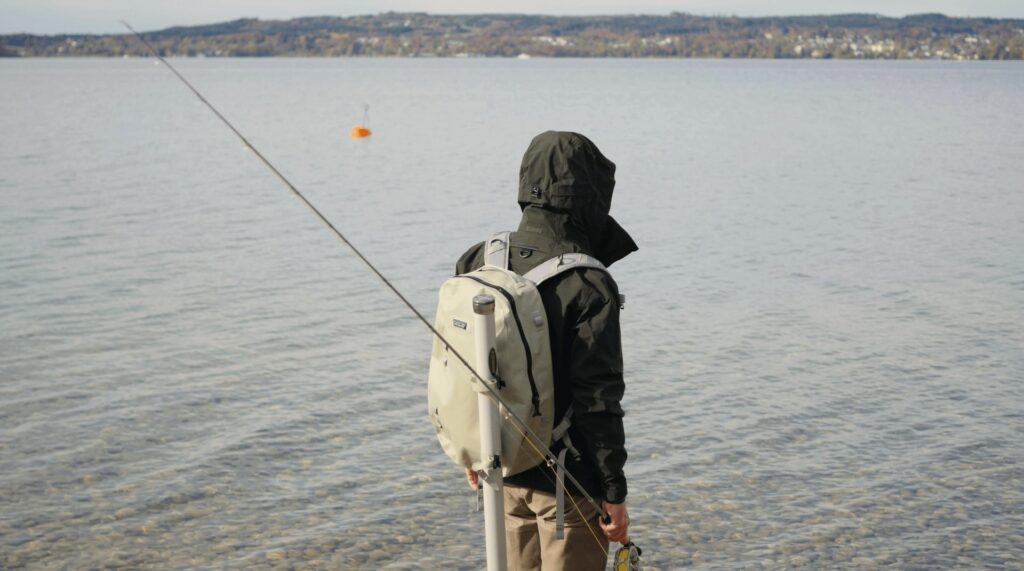
Water-Resistant Backpacks: Weathering the Storm
Rain Covers: A Shield Against Showers
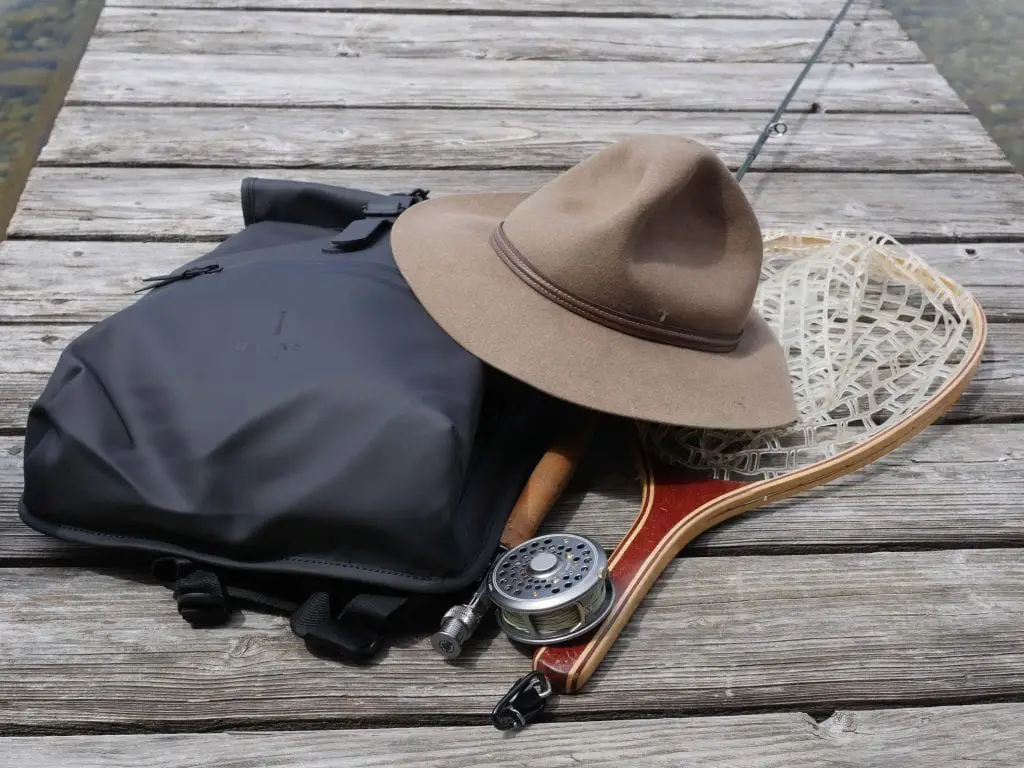
Water-resistant backpacks take a slightly different approach. While they may not withstand complete submersion, they are excellent at repelling light rain and drizzles. Many water-resistant backpacks come equipped with built-in rain covers. These covers are like capes for your backpack, easily deployable to shield your gear when the clouds decide to open up. If your adventures involve occasional rain showers rather than full-blown aquatic escapades, a water-resistant backpack with a rain cover might be the practical choice.
Water-Resistant Zippers: Keeping Moisture at Bay
Water-resistant zippers are a middle ground between regular zippers and their fully waterproof counterparts. They are treated with a durable water repellent (DWR) coating, making them resistant to light rain and moisture. While not as impenetrable as waterproof zippers, they provide an added layer of defense against unexpected showers. If you’re often caught in sporadic rain but don’t require full submersion protection, a backpack with water-resistant zippers might be your ideal companion.
Conclusion on Waterproof vs Water Resistant Backpack
In the end, the choice between a waterproof and water-resistant backpack boils down to the nature of your adventures. If you find yourself in situations where complete water immersion is a real possibility, investing in a fully submersible backpack with waterproof zippers is the way to go. For more casual use with occasional rain exposure, a water-resistant backpack equipped with rain covers and water-resistant zippers provides a practical and versatile solution. Remember, the best backpack for you is the one that aligns with your specific needs and the kind of adventures you embark upon.
FAQ Section: Waterproof vs Water Resistant Backpack
Can a water-resistant backpack protect my electronics in heavy rain?
In light to moderate rain, a water-resistant backpack with properly sealed seams and zippers should offer sufficient protection for your electronics. However, for heavy rain or water-related activities, a fully waterproof backpack is recommended.
Are all waterproof backpacks fully submersible?
No, not all waterproof backpacks are fully submersible. Some are designed to withstand heavy rain and splashes, while others can handle complete submersion. Check the specifications and product details for the level of water protection offered.
Can I use a rain cover on a fully waterproof backpack?
While it’s technically possible, it’s not recommended. Fully waterproof backpacks are designed to be watertight without the need for additional covers. Using a rain cover might compromise the breathability of the backpack.
Do water-resistant zippers wear out over time?
Yes, the water-resistant coating on zippers can wear off over time with regular use. It’s essential to follow care instructions provided by the manufacturer to maintain the water-resistant properties.
Are water-resistant backpacks suitable for winter conditions?
Water-resistant backpacks can handle light snow and moisture, but for prolonged exposure to wet conditions, including heavy snow or slush, a fully waterproof backpack is advisable.

